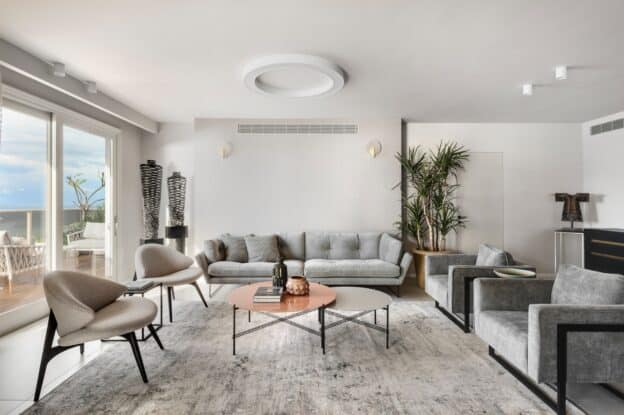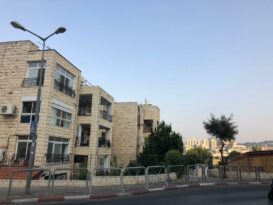What is the management fee? What tax rate is charged? How should you design the apartment? What regulations do local authorities impose? Does an Airbnb end up being more lucrative than a regular rental? Ahead of the holidays – Buyitinisrael brings you the complete guide to renting an apartment through Airbnb
The holiday season is approaching, and with it, the demand for short-term apartment rentals is expected to reach record levels. From the end of September to the middle of October, thousands of apartments will be occupied by tourists who choose to stay in an apartment over a hotel, mainly in the city centers of Jerusalem and Tel Aviv, but also in Eilat, Netanya, Herzliya, and Tiberias. For those who own an investment apartment in these areas that are rented under a standard contract that is renewed annually, periods of this kind raise the question of whether or not to join the hot trend of recent years, and make the apartment available for short-term rental, through the Airbnb website or another platform.
Allegedly, the system by which apartments can be rented out in this way is simple. Take a picture of the apartment, open a user card on the site and start renting. Until about a decade ago, in the early years of Airbnb, this is indeed the way it was done. But since then the field has become more sophisticated and short-term vacation rentals have become a real industry. A large proportion of Airbnb apartments today are designed as guesthouses and offer hotel management services including a change of bed linen and towels. In the Israeli market alone, there are several dozen companies that specialize in managing properties offered for rent for short periods, each of which owns several dozen or even hundreds of apartments.
Making the apartment available for rent in this manner may turn out to be much more lucrative than a regular form of renting, but the expenses involved in it are also heavy. First, in the competitive environment of Tel Aviv, where thousands of apartments are offered for rent, the apartment must be carefully designed and equipped. If the management is not carried out directly by you, a management company will charge a hefty commission of at least 20% of the revenue.
According to Yoel Schwartz, owner of the management company Birkat HaBayit, which manages properties in Tel Aviv and Jerusalem, including renting them out for short periods, “Many people dream of a high level of income when they designate their apartments for short-term rental. But then they discover that for much of the year the apartment is empty. In prime locations, this is less severe. In Neve Tzedek, let’s say, it will be possible to rent out the apartment throughout the year. But if someone has an apartment in Givatayim or Ramat Aviv, he may find that the apartment is rented during the summer months and holiday periods but not the rest of the time. The bottom line is that it is not certain that the choice of short-term rentals will pay off.”
According to Schwartz, he had previously used Airbnb’s short-term rental platform but stopped after a number of negative events. “In one case, we rented a penthouse apartment in the center of Tel Aviv to a group of young people from Los Angeles, who left behind Sodom and Gomorrah. First, you argue with the management of Airbnb, which is based in Ireland, and then with the tenants themselves who have long since returned to the U.S.” Today, he says, he continues to offer the apartments under his management to tenants who are interested in them for the short term, as long as he can get security. This includes, for example, medical tourists or guests of embassies.”
Converting a property into a short-term rental requires, as stated, an investment in furniture and accessories. According to architect Shira Muskal, a partner at Hillel Architecture and Interior Design, this is not the type of design you would give your own apartment.: “The design has to be done according to a certain concept and according to the atmosphere you want to create in this unit. As when a person enters a hotel, he walks into some kind of a story. It’s not just a room but something with a very specific atmosphere. It has to have its own mark, something that distinguishes only it through color and accessories.”
According to Muskal, the various types of textiles used to have particular importance in creating the atmosphere, such as luxurious bedding, high-quality towels, and curtains. The other thing that should be considered are luxuries such as a coffee machine, a home theater system, jets in the shower, underfloor heating, and things that differentiate the guest’s stay in the apartment from his daily routine.

Finally, since this is an apartment that is expected to accommodate a high turnover of tenants, the planning, according to Muskal, must be aimed at reducing wear and tear. “Create a practical design where there is no touching of furniture and closets or shower stalls and sink cabinets. All surfaces should be made of natural-looking materials that do not wear, scratch, or absorb stains easily and are not too difficult to clean. For example, synthetic parquet flooring and nothing with a high shine, granite countertops and not natural stone.”
But before embarking on the expensive process of design and preparation, there is another aspect that is important to check and that is whether renting your apartment for vacation, through Airbnb or any other platform, is legal. In general, there is no law that prohibits the rental of apartments by these means, and it seems that the state rarely intervenes in the way apartment owners choose to use them.
However, while the state does not intervene, sometimes the local authority gets involved, especially in cases where it finds that extensive short-term rentals harm its interests or those of its residents. So far, there have been a number of cases in which the local authorities issued stop-operation orders for Airbnb apartments, and in all cases that went to court, the apartment owners lost. The reason for this is that usually the apartments are built on lots zoned for “residential”. However, according to the local authorities, the activity in the Airbnb apartments is not residential but for hotel purposes.
However, so far the number of authorities that have acted against the phenomenon has been extremely limited, including Tzefat and Mitzpe Ramon. In Tel Aviv and Jerusalem, the two largest markets, the authorities have not raised a brow, to the delight of the thousands of homeowners who rent out their apartments for short-term periods. In any case, any property owner who is considering converting it into an Airbnb would do well by checking the policy of the local authority in which the property is located, before starting the process.

“In general, Israeli law does not allow the use of a residential apartment as an Airbnb, but there is no regulation that regulates this. Therefore, there is room for caution”, says Adv. Assaf Iron of S. Friedman & Co., which specializes in planning and construction law. “. Experience shows that most complaints and enforcement have been made against villas, where the nature of the activity is noisier, while in residential buildings the same level of enforcement does not apply.”
It should also be noted that the various tax exemptions on income from the rental of residential apartments do not apply to the rental of apartments for short periods of time, and income is taxed from the first shekel earned, either as passive income (31% tax) or income tax depending on the nature of the business activities (number of apartments, the volume of rentals, etc.).
Finally, another important consideration for how to best utilize your investment property in Israel is your personal usage of the property. If you intend to use the apartment yourself for the holidays or breaks and do not want to lock it into a long-term agreement, short-term rentals may be the way to go, for you.
The bottom line is that renting an Airbnb property has the potential to significantly increase ROI, but also comes with headaches and challenges, more so compared to regular rentals. After weighing up the costs involves in both preparing and managing the property, the tax consequences, and the intended personal usage of the apartment, it should be clear which route is best for you. For those on the fence, if you’re into home design and hospitality, you may enjoy the journey. Good luck!








